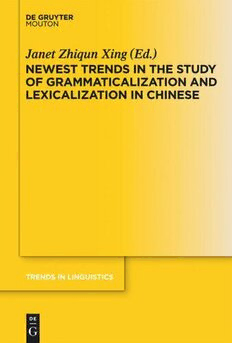Download Newest Trends in the Study of Grammaticalization and Lexicalization in Chinese PDF Free - Full Version
Download Newest Trends in the Study of Grammaticalization and Lexicalization in Chinese by Janet Zhiqun Xing (editor) in PDF format completely FREE. No registration required, no payment needed. Get instant access to this valuable resource on PDFdrive.to!
About Newest Trends in the Study of Grammaticalization and Lexicalization in Chinese
Grammaticalization and lexicalization have been two major issues in the study of diachronic change in the past few decades. Drawing evidence from Western languages, researchers have uncovered a number of characteristics of the process of grammaticalization and lexicalization, as well as the relationship between the two. However, the question remains whether or not those characteristics are applicable to genetically unrelated and typologically different languages, such as Chinese. The contributors of this volume attempt to answer just this question. Based on Chinese historical data from the past three thousand years, five articles in the volume investigate the development of a certain grammatical category: the definite article (M. Fang), modal verbs of volition (A. Peyraube and M. Li), the classifier class (J.Z. Xing), the repeater class (C. Zhang), and the process of lexicalization (X. Dong), while the remaining four articles are case studies of unique grammatical words which have all undergone a complicated process of grammaticalization and some involved lexicalization: the sentence particle ye (Q. Chen), the versatile directional verb lái (C. Liu), the degree adverb hen (M. Liu and C. Chang), and the giving verb gei (F. Tsao). All these studies have identified tendencies of diachronic change in Chinese and some of them have also revealed certain typological characteristics that Chinese has compared to other languages.
Detailed Information
| Author: | Janet Zhiqun Xing (editor) |
|---|---|
| Publication Year: | 2012 |
| ISBN: | 9783110252996 |
| Pages: | 312 |
| Language: | English |
| File Size: | 2.646 |
| Format: | |
| Price: | FREE |
Safe & Secure Download - No registration required
Why Choose PDFdrive for Your Free Newest Trends in the Study of Grammaticalization and Lexicalization in Chinese Download?
- 100% Free: No hidden fees or subscriptions required for one book every day.
- No Registration: Immediate access is available without creating accounts for one book every day.
- Safe and Secure: Clean downloads without malware or viruses
- Multiple Formats: PDF, MOBI, Mpub,... optimized for all devices
- Educational Resource: Supporting knowledge sharing and learning
Frequently Asked Questions
Is it really free to download Newest Trends in the Study of Grammaticalization and Lexicalization in Chinese PDF?
Yes, on https://PDFdrive.to you can download Newest Trends in the Study of Grammaticalization and Lexicalization in Chinese by Janet Zhiqun Xing (editor) completely free. We don't require any payment, subscription, or registration to access this PDF file. For 3 books every day.
How can I read Newest Trends in the Study of Grammaticalization and Lexicalization in Chinese on my mobile device?
After downloading Newest Trends in the Study of Grammaticalization and Lexicalization in Chinese PDF, you can open it with any PDF reader app on your phone or tablet. We recommend using Adobe Acrobat Reader, Apple Books, or Google Play Books for the best reading experience.
Is this the full version of Newest Trends in the Study of Grammaticalization and Lexicalization in Chinese?
Yes, this is the complete PDF version of Newest Trends in the Study of Grammaticalization and Lexicalization in Chinese by Janet Zhiqun Xing (editor). You will be able to read the entire content as in the printed version without missing any pages.
Is it legal to download Newest Trends in the Study of Grammaticalization and Lexicalization in Chinese PDF for free?
https://PDFdrive.to provides links to free educational resources available online. We do not store any files on our servers. Please be aware of copyright laws in your country before downloading.
The materials shared are intended for research, educational, and personal use in accordance with fair use principles.

